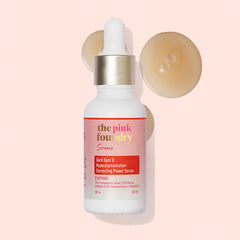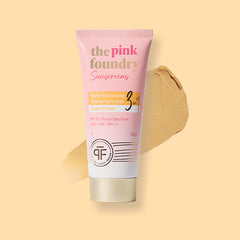The Best Moisturiser Ingredients You Cannot Miss
Moisturisers hydrate the skin by supplying essential water and oils. They contain humectants to attract moisture and emollients to smooth and soften the skin. Choosing the right moisturiser texture and ingredients for skin type is key to optimal hydration and skin barrier health. Apply moisturiser while the skin is damp for best absorption.
Choosing the right moisturiser can be crucial for healthy and glowing skin. With so many available options, knowing which ingredients can deliver hydration and nourishment can be confusing. This blog will discuss the best moisturiser ingredients that should be part of one's skincare routine.
Key Moisturiser Ingredients
When it comes to moisturisers, not all ingredients are equal. Some provide surface-level hydration, while others nourish the skin on a deeper level. This section covers some of the best ingredients for moisturising one's skin:
- Hyaluronic AcidHyaluronic acid is a superstar ingredient for dry and dehydrated skin. Naturally found in the skin, hyaluronic acid has incredible water-binding properties and can hold up to 1,000 times its weight in water. By drawing moisture from the environment into the skin, hyaluronic acid provides intense hydration that plumps, firms and smooths skin. The Pink Foundry's Waterlight Gel Moisturiser 72 Hour Hydration, containing hyaluronic acid, is designed to give instant supple, soft, and hydrated skin.
- GlycerinLike hyaluronic acid, glycerin is a humectant that attracts water into the skin's top layers. It moisturises while restoring the skin's protective barrier to prevent moisture loss. Glycerin is very compatible with all skin types. If you suffer from acne, you can reap the benefits of glycerin for pimples and its healing properties through a glycerin-based moisturiser.
- CeramidesCeramides are lipids in the skin's barrier that help lock in moisture and protect against environmental damage. Moisturisers formulated with ceramides replenish the skin's lipid levels, repair the moisture barrier and improve hydration. They are especially beneficial for dry and aged skin.
- SqualaneSqualane is an exceptional emollient derived from olives that provides long-lasting hydration without leaving skin greasy. It strengthens the skin's moisture barrier, boosts elasticity, and creates a smooth base for makeup application. Squalane is suitable for all skin types, including sensitive and acne-prone skin.
- NiacinamideAlso known as vitamin B3, niacinamide is a true multitasker. It hydrates, improves skin texture, minimises pores, and builds healthier skin over time. By strengthening the skin's protective barrier, niacinamide enables the skin to retain moisture better. It also reduces inflammation and redness.
Best Ingredients for Different Skin Types
When shopping for a moisturiser, it's important to consider one's skin type. Here are some of the best ingredients tailored to different skin types:
|
Skin Type |
Best ingredients |
Benefits |
|
Dry Skin |
Shea butter |
Skincare products containing shea butter can deeply moisturise and nourish extra-dry skin. |
|
Plant oils like argan, jojoba, almond |
These oils provide intense hydration to replenish dryness. |
|
|
Hyaluronic acid |
HA binds moisture to severely parched skin. |
|
|
Ceramides |
Ceramides can help one repair protective barriers and seal in moisture. |
|
|
Glycerin |
Glycerin draws moisture into the skin's surface. |
|
|
Oily Skin |
Gel moisturisers |
These moisturisers offer lightweight, oil-free hydration |
|
Hyaluronic acid |
Skincare products containing hyaluronic acid boost hydration without extra oil |
|
|
Niacinamide |
Beneficial in controlling excess sebum and shine |
|
|
Salicylic acid |
Beneficial in gentle exfoliation and unclogging of pores |
|
|
Mattifying |
Ingredients like silica help absorb oil and blur the pores |
|
|
Sensitive Skin |
Aloe vera |
Aloe vera soothes and calms irritated skin |
|
Oat extract |
Oat extracts have anti-inflammatory and skin-protecting properties. |
|
|
Jojoba oil |
Jojoba oil can mimic the skin's natural oils to hydrate without irritation. |
|
|
Vitamin E |
Vitamin E is a strong antioxidant that can defend the skin against inflammation. |
|
|
Ceramides |
Ceramides can strengthen the skin barriers against aggressors. |
How to Choose the Right Moisturiser for Your Skin
With countless moisturiser options in the market, choosing the best one for one's skin can get overwhelming. Here are some helpful tips to consider:
- Texture Preferences: Choose the moisturiser texture best suited for your skin type. Creams and butter are used for dry skin, gels and serums for oily skin, and lotions for combination skin.
- Seasonal Variations: During summer, choose an oil-free, lightweight, gel-based moisturiser that doesn't feel heavy. In winter, use rich, ultra-hydrating creams to combat dry air.
- Ingredient Check: Read ingredient lists and look for skin-nourishing ingredients like hyaluronic acid, plant oils, and ceramides. Avoid skincare products containing alcohol and fragrance.
- Perform a Patch Test: To test for potential irritation or breakouts, apply a small amount on your inner arm for a few days before full use.
Conclusion
Great moisturisers provide more than just surface hydration. They can help one improve their skin's overall health. Opting for moisturisers containing ingredients like hyaluronic acid, ceramides, and plant oils can ensure the skin gets specific solutions.
Avoid harsh skin care products containing alcohol and fragrances, which can disrupt the skin's moisture barrier. Always patch-test skin care products before full use. Investing in the right moisturiser tailored to one's skin type gives you the building blocks for achieving healthy, radiant skin.
FAQs
This section covers the most frequently asked questions about the best moisturiser ingredients.
Q1: What are the best ingredients for a moisturiser for dry skin?
A1: People with dry skin should look for rich moisturisers containing emollient oils, butter, and waxes like shea butter, argan oil, and lanolin. Humectants like hyaluronic acid and glycerin can help boost hydration, while ceramides can help repair the skin barriers to lock in moisture.
Q2: How can I choose the right moisturiser for sensitive skin?
A2: One should choose a fragrance-free moisturiser formulated with skin-soothing ingredients like aloe, oat extract, jojoba oil, and vitamin E. It is better to perform a patch test first to check for irritation and avoid ingredients like alcohol, fragrances and harsh acids that can further irritate the skin.
Q3: What moisturiser ingredients should I avoid for acne-prone skin?
A3: Avoid skincare products containing mineral oil, coconut oil, and cocoa butter, which can clog pores. Also, avoid thick, greasy creams that can feel heavy on acne-prone skin. Check for ingredients in moisturising creams that are non-comedogenic, oil-free, and water-based. Opt for moisturising gels with mattifying ingredients. The Pink Foundry's Acne Care & Healing Gel Moisturiser with Tea Tree & Cica has been specifically for skin types prone to acne.










